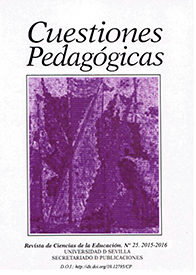Migración y calidad de vida. Una propuesta de estudio centrada en los migrantes.
DOI:
https://doi.org/10.12795/CP.2016.i25.07Palabras clave:
Migración, Movilidad, Desarrollo, Bienestar, CapacidadesResumen
La migración internacional es un fenómeno relevante que caracteriza el momento actual, en el que se ocultan muchas desigualdades. Este artículo examina las principales teorías explicativas presentes en la literatura sobre migración, las organiza y agrupa según la perspectiva que utilizan. Después de indicar las debilidades de cada enfoque, este trabajo subraya algunas grandes separaciones, que resaltan la necesidad de un análisis integrado que considere contemporáneamente los distintos niveles que constituyen este complejo fenómeno. Con esta finalidad se propone utilizar el “Capability Approach” como enfoque multidimensional para el análisis del bienestar y desarrollo humano de los migrantes. El propósito último de este artículo es demostrar la necesidad de involucrar a los propios migrantes, como agentes variados que se diferencian entre sí por una serie de características personales, y que deciden mudarse por una pluralidad de razones, además de estar respaldados por muy diversas condiciones políticas, sociales y económicas. Este trabajo pretende proporcionar la base teórica para una futura investigación empírica, que estudie la satisfacción de los migrantes, analice la influencia de la experiencia migratoria en el desarrollo y conjunto de capacidades de la persona, en término de realización personal percibida y logro de objetivos individuales.
Descargas
Citas
Allardt, E. (1993). Having, Loving, Being: An Alternative to the Swedish Model of Welfare Research. In M. Nussbaum & A. Sen (Eds.), The Quality of Life (pp. 88–94). Oxford University Press. Retrieved from http://www.oxfordscholarship.com/view/10.1093/0198287976.001.0001/acprof- 9780198287971-chapter-8
Berry, J. W. (1997). Immigration, Acculturation, and Adaptation. Applied Psychology, 46(1), 5–34. https://doi.org/10.1111/j.1464-0597.1997.tb01087.x
Böhnke, P. (2005). First European Quality of Life Survey: Life satisfaction, happiness and sense of belonging (No. EF0591) (p. 102). Luxembourg: European Foundation for the Improvement of Living and Working Conditions. Retrieved from http://www.eurofound.europa.eu/publications/report/2005/quality-of-life/first- european-quality-of-life-survey-life-satisfaction-happiness-and-sense-of-belonging
Bonfanti, S. (2014). Towards a Migrant-Centred Perspective on International Migration: The Contribution of Amartya Sen’s Capability Approach. Social Work & Society, 12(2), 1–13.
Boyle, P., Halfacree, K. H., y Robinson, V. (2014). Exploring Contemporary Migration.
Routledge.
Briones, L. (2009). Reconsidering the migration–development link: capability and livelihood in Filipina experiences of domestic work in Paris. Population, Space and Place, 15(2), 133–145. https://doi.org/10.1002/psp.532
Conradie, I., y Robeyns, I. (2013). Aspirations and Human Development Interventions. Journal of Human Development and Capabilities, 14(4), 559–580. https://doi.org/10.1080/19452829.2013.827637
Czaika, M., y Vothknecht, M. (2014). Migration and aspirations – are migrants trapped on a hedonic treadmill? IZA Journal of Migration, 3(1), 1. https://doi.org/10.1186/2193- 9039-3-1
De Haas, H. (2011). The determinants of international migration. Conceptualizing policy, origin and destination effects. IMI Working Papers Series, Paper 32.
De Haas, H., y Rodríguez, F. (2010). Mobility and Human Development: Introduction. Journal of Human Development and Capabilities, 11(2), 177–184. https://doi.org/10.1080/19452821003696798
De Jong, G. F. (2000). Expectations, gender, and norms in migration decision-making. Population Studies, 54(3), 307–319. https://doi.org/10.1080/713779089
Department of Economic and Social Affairs. (2016). International Migration Report 2015: Highlights (Population Division No. ST/ESA/SER.A/375). New York: United Nations.
Eurofond. (n.d.). Encuesta europea sobre calidad de vida (EQLS). Retrieved October 15, 2016, from http://www.eurofound.europa.eu/es/surveys/european-quality-of-life- surveys
Faist, T. (2009). The Crucial Meso-level. In M. Martiniello & J. Rath (Eds.), Selected Studies in International Migration and immigration Incorporation. Retrieved from http://pub.uni-bielefeld.de/publication/2604843
Glick Schiller, N., Basch, L., y Blanc-Szanton, C. (1992). Towards a Definition of Transnationalism. Annals of the New York Academy of Sciences, 645(1), ix–xiv. https://doi.org/10.1111/j.1749-6632.1992.tb33482.x
Iversen, V. (2003). INTRA-HOUSEHOLD INEQUALITY: A CHALLENGE FOR THE CAPABILITY APPROACH? Feminist Economics, 9(2-3), 93–115. https://doi.org/10.1080/135457003200008086
Killian, C., Olmsted, J., y Doyle, A. (2012). Motivated migrants: (Re)framing Arab women’s experiences. Women’s Studies International Forum, 35(6), 432–446. https://doi.org/10.1016/j.wsif.2012.09.006
LaFromboise, T., Coleman, H., y Gerton, J. (1993). Psychological impact of biculturalism: evidence and theory. Psychological Bulletin, 114(3), 395–412. https://doi.org/10.1037/0033-2909.114.3.395
Martin, P. (2013). The Global Challenge of Managing Migration. Population Bulletin, 68(2). Nussbaum, M. C. (2001). Women and Human Development: The C apabilities Approach. Cambridge University Press.
Piore, M. J. (1972). Notes for a theory of labor market stratification (Working Paper). [Cambridge, Mass., M.I.T.]. Retrieved from http://dspace.mit.edu/handle/1721.1/64001
Robeyns, I. (2005a). Selecting Capabilities for Quality of Life Measurement. Social Indicators Research, 74(1), 191–215. https://doi.org/10.1007/s11205-005-6524-1
Robeyns, I. (2005b). The Capability Approach: a theoretical survey. Journal of Human Development, 6(1), 93–117. https://doi.org/10.1080/146498805200034266
Safi, M. (2010). Immigrants’ Life Satisfaction in Europe: Between Assimilation and Discrimination. European Sociological Review, 26(2), 159–176. https://doi.org/10.1093/esr/jcp013
Sen, A. (1985). Well-Being, Agency and Freedom: The Dewey Lectures 1984. The Journal of Philosophy, 82(4), 169–221. https://doi.org/10.2307/2026184
Stark, O., y Bloom, D. (1985). The New Economics of Labor Migration. The American Economic Review, 75(2), 173–178.
Todaro, M. P. (1969). A Model of Labor Migration and Urban Unemployment in Less Developed Countries. The American Economic Review, 59(1), 138–148.
Wallerstein, I. (1980). The modern world system. Academic Press.
Descargas
Publicado
Cómo citar
Número
Sección
Licencia
Aquellos autores/as que tengan publicaciones con esta revista, aceptan los términos siguientes:
- Los autores/as conservarán sus derechos de autor y garantizarán a la revista el derecho de primera publicación de su obra, el cuál estará simultáneamente sujeto a la Licencia de reconocimiento de Creative Commons que permite a terceros compartir la obra siempre que se indique su autor y su primera publicación esta revista.
- Los autores/as podrán adoptar otros acuerdos de licencia no exclusiva de distribución de la versión de la obra publicada (p. ej.: depositarla en un archivo telemático institucional o publicarla en un volumen monográfico) siempre que se indique la publicación inicial en esta revista.
- Se permite y recomienda a los autores/as difundir su obra a través de Internet (p. ej.: en archivos telemáticos institucionales o en su página web) antes y durante el proceso de envío, lo cual puede producir intercambios interesantes y aumentar las citas de la obra publicada.




